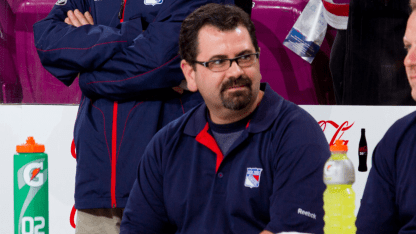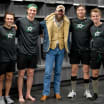Rangers equipment manager Marques supported in cancer battle
Friend, role model been with New York since 1993-94 season

Marques, who goes by "Cass," is the Rangers head equipment manager and has been with the team since 1993-94, their Stanley Cup championship season. The 53-year-old is one of those essential behind-the-scenes employees players rely on.
Except for the Rangers players, current and past, Cass is more than a colleague. He's a best friend, a life coach, a role model. He's family, which has made what he's going through now all the more terrifying to his Rangers family.
Marques has colon cancer and is currently undergoing chemotherapy treatments.
"He has that presence that you really notice when he's not around," Zibanejad said. "I think it's even more when you know why. Obviously, he's in our thoughts every time that happens and you think about him even more. It is weird. You talk about the staff behind the scenes, it's 'Cass.' He's the guy that comes up first and to not to have him around, to not have that, 'Good morning,' and happy guy that is staring you in the face and greeting you every morning when you come to the rink, it's pretty noticeable."
Marques has been in and out of the rink this season because of various doctor visits, and surgery he had on Nov. 15 to remove a large portion of the left upper lobe of his left lung, where cancer cells were discovered through a CT scan.
He never stopped working, using technology to stay up to date when he was laid up after surgery, and his energy and motivation to be at the rink and on the bench once doctors allowed him to be.
Marques, though, said he's distancing himself from the players as best he can in part because the surgery has left him vulnerable to COVID-19. He's spending more time in his office and sharpening skates and working on equipment when they're not around.
"Not having him around the rink every single day is different and it's hard," Rangers forward Chris Kreider said. "But we know he's going to be able to beat this and he's going to fight like hell."
\\\
The Rangers' love and appreciation for Marques were obvious when they held their annual Hockey Fights Cancer night at Madison Square Garden on Nov. 21, six days after his surgery.
Zibanejad, Kreider, and forwards Alexis Lafreniere, Ryan Reaves, Ryan Strome, Filip Chytil and Julien Gauthier all honored Marques by writing his name on their "I Fight For" placards.
"It wasn't fair that they were trying to make me cry," Marques said, laughing.
Kreider and Zibanejad said they each individually decided to do it on their own.
"There was no discussion," Kreider said. "It was not like, 'Oh, we're all going to do this.' It just goes to show you how much he means to everyone as a person. He treats everyone the same regardless of whether you've been here for a long time or whether you're a young kid who has just walked in the door. He's the kind of person that you want to work with, that you want to go to battle with, that you want to spend time with. He's one of the greatest people you'll ever meet."
The love spread around the NHL.
Former Rangers forward Pavel Buchnevich held up the "I Fight For" placard in honor of Marques at the St. Louis Blues Hockey Fights Cancer night on Nov. 22. Buchnevich was traded from the Rangers to the Blues on July 23.
Ryan McDonagh, a defenseman with the Tampa Bay Lightning and a former Rangers captain, did the same at the Lightning Hockey Fights Cancer night on Nov. 21.
"Cass was my first equipment trainer in the NHL and set a high bar as far as how to treat players and respect everyone he works with," McDonagh said in a text message. "He goes above and beyond to help you with anything, both on and off the ice. Praying for him and wishing him a healthy and speedy recovery."
Marques said he was blown away by the support.
"The reason why I didn't expect it is because everybody has somebody that is special in their lives that might be fighting cancer," Marques said. "Every player has somebody, a grandmother or a father, maybe a brother or a sister that might be going through this."
Marques added he didn't realize he is one of those special people to the players who know him.
"Cass, with his experience with young players, he has a massive impact on who they become as people," Kreider said. "He's universally loved, but he's also universally respected because of the way he conducts himself and carries himself. People really look up to him, as they should. He plays such a large role independent of the things he does on a day-to-day basis from an equipment standpoint in terms of molding young men.
"He's a very humble guy, I don't think he would take credit for that, but I know personally things he's shared with me and things I've learned from him [that] have really helped me become the man that I've become. 'Cass' is an enormous part of our culture. He means everything to this group. He is an institution."
\\\
Cancer cells were originally discovered through a colonoscopy Marques had in the spring of 2018, one month after his father died from colon cancer. The cancers weren't a genetic match, Marques said, just coincidence in location and timing.
"Baffled," he said to describe his reaction at the time.
Marques had a carcinoembryonic antigen (CEA) blood test done after the discovery and his numbers were normal, which led his doctors to determine he would be cancer-free once they removed a foot of his colon that was infected.
There was one caveat; Marques said his doctors warned him there was a five percent chance that a cancerous cell could have escaped the intestinal wall and ended up in his system.
"I was the lucky winner, I guess," Marques said.
He did his annual colonoscopy this past August when his doctor also ran the same CEA blood test even though it wasn't deemed necessary.
This time his numbers were high, more than double over what is considered the upper threshold of normal, Marques said.
A CT scan revealed the colon cancer had spread to his left lung. A biopsy confirmed it and a positron emission tomography (PET) scan determined it was isolated to the upper lobe.
He had surgery 10 days later and chemotherapy treatments started last week.
His prognosis is good, his outlook is positive, and his message is clear.
"I was 50 when I did a colonoscopy, which at the time was when they recommended that you did it," Marques said. "Now it's 45. It's really not a big deal. Everybody should go and do this. You have a great 45-minute nap, and you wake up and it could change your life drastically."

















